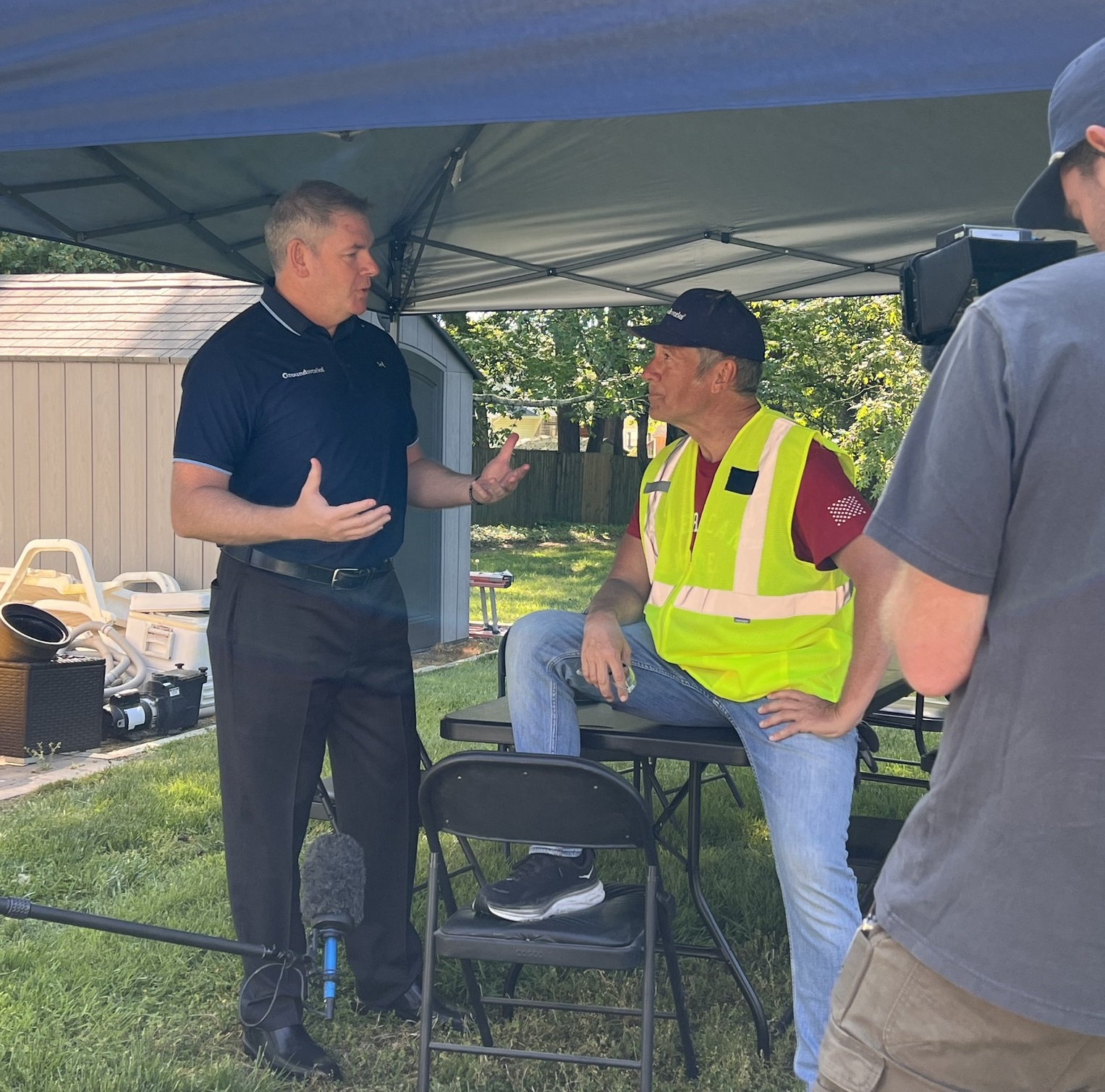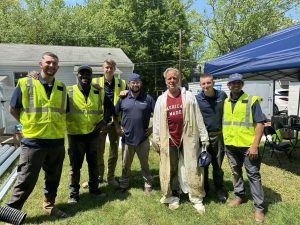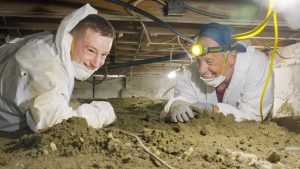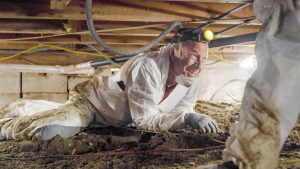
Last year, I was invited to speak at a gathering in Virginia Beach, hosted by a company that specializes in repairing residential foundations, encapsulating crawl spaces, and waterproofing basements. On Dirty Jobs, I had the opportunity to perform all of these tasks, and I can tell you with certainty that few jobs out there require more grit, more stamina, and more tenacity. Lifting a house in the air to repair its foundation is complicated, backbreaking work. So too, is waterproofing a basement. And the business of encapsulating a crawl space on a 100-degree day requires a measure of mental toughness and physicality that can’t really be described. To appreciate it, you have to do it.
Anyway, this particular gathering was a celebration, hosted by a company called Groundworks, and I was honored to attend. Because this was the day that Groundworks was going to announce a corporate restructure that would turn 5,400 hundred hardworking dirty jobbers into owners of a billion-dollar company.
I was standing in the wings when Matt Malone, the CEO of the company, made the announcement, and it was a very emotional moment. Looking out into the audience, I could see the look of disbelief on  hundreds of faces. So many men, most in their twenties and thirties, were overcome. These were men who, by and large, had never been to college. Men who had been working their butts off since high school, usually out of sight and out of mind, doing the kind of critical jobs that most people work hard to avoid. Now, they were being appreciated, acknowledged, and most of all, financially rewarded in a way that would change their lives.
hundreds of faces. So many men, most in their twenties and thirties, were overcome. These were men who, by and large, had never been to college. Men who had been working their butts off since high school, usually out of sight and out of mind, doing the kind of critical jobs that most people work hard to avoid. Now, they were being appreciated, acknowledged, and most of all, financially rewarded in a way that would change their lives.
Later that evening, after shaking hands with 5,400 hundred new business owners, I wound up in the hotel bar with Matt, where he told me the story of how he grew Groundworks from a single branch into a billion-dollar company in just seven years. The risk he assumed early on will be familiar to many entrepreneurs. Matt had to move back into his mother’s home, along with his wife and two kids. He leveraged everything he had, and then he convinced other people to bet on his vision. Eventually, he raised the money he needed to buy a few other companies in the same space, in various parts of the country. Then he went about the business of making those companies more profitable and more efficient.
“I didn’t know the first thing about the home services business,” Matt told me. “But I understood the importance of work ethic, and when I saw what this job requires, and how hard these guys work every single day, I wanted them to participate directly in the success of this company, just like the executives do.”
Over the years, I’ve met a lot of CEO’s who pay lip service to hard work, but very few who put their money where their mouth is – especially in the blue collar world. I congratulated Matt for taking an important step in shrinking the divide between labor and management and asked if doing so had made an impact on recruiting.
 “Too early to tell, but I sure hope so,” he said. “Our growth is tied directly to our ability to find people with the grit to do this job. And those people are in short supply. Nothing against college, but I don’t need people with degrees. I don’t even need people with experience. I need people with ambition, a good attitude, and a willingness to learn.”
“Too early to tell, but I sure hope so,” he said. “Our growth is tied directly to our ability to find people with the grit to do this job. And those people are in short supply. Nothing against college, but I don’t need people with degrees. I don’t even need people with experience. I need people with ambition, a good attitude, and a willingness to learn.”
“How many?” I asked. “How many such people could you hire right now, if they showed up ready for work?”
“Hundreds,” he said. “Literally hundreds. If you’re willing to work, the opportunities here are endless. And the path to a six-figure salary is fast and straight.”
The longer we spoke, the clearer it became that Matt shared many of my own concerns about the state of labor in America. We talked about the alarming fact that for every 5 tradespeople who retire, 2 replace them. We discussed the insane cost of college, the madness of pushing an entire generation into the university system, the scandal of $1.7 trillion dollars of outstanding student debt, and the rank injustice of forcing hard working people with no degree to pay for that debt. Mostly though, we talked about the sad fact that 64% of Americans now believe the American Dream is dead, or no longer applicable to them. So many people don’t believe – or don’t want to believe – that millions of good jobs are out there, and that a solid work ethic and a willingness to learn can still lead to a six-figure career in no time, and with no college.
“You should bring back Dirty Jobs,” said Matt. “That show did more to elevate grit than anything else on television.”
“My joints might have something to say about,” I said. “But in the meantime, here’s an idea.”
The bourbon was exceptionally smooth that evening, and perhaps to blame for what I said next.
“Have you ever considered putting your guys at the center of your own marketing campaign?”
“No, I haven’t. What would that look like?” he asked.
“Well,” I said, it would look a lot like an episode of Dirty Jobs. I’d spend a day or two as an apprentice with your guys, fixing foundations, encapsulating crawl spaces, and waterproofing basements. No scripts, no actors, no second takes, and no ad agencies. Just an honest look at what your people do day in and day out. We’d show Americans exactly what’s going on under their houses, and along the way, we’d make it clear that opportunity in this country is still alive and well, even for people who didn’t go to college.”
I knew that Matt could never agree to such a campaign. Groundworks is a BIG company, and no CEO in his right mind would greenlight a major advertising initiative with no actors, no scripts, no second takes, and no ad agency attached. It simply isn’t done.
“Sounds great,” said Matt. “Let’s do it.”
 Anyhow, that’s how I wound up under a house in Baltimore with a team of newly minted business owners who worked my aging ass into the dirt. It was hot, difficult, claustrophobic, and uncomfortable. But it was also great, and I’m really proud of the content we got. The guys I worked with were smart, funny, dogged, and fearless. They were a band of brothers, proud to be doing a job that mattered.
Anyhow, that’s how I wound up under a house in Baltimore with a team of newly minted business owners who worked my aging ass into the dirt. It was hot, difficult, claustrophobic, and uncomfortable. But it was also great, and I’m really proud of the content we got. The guys I worked with were smart, funny, dogged, and fearless. They were a band of brothers, proud to be doing a job that mattered.
So, is Groundworks is the new model for the home service industry? I don’t know. Private equity – and unions for that matter – are not always the best solution in every case, so I hesitate to paint with too broad a brush. But I do know that millions of jobs are open as we speak. Opportunity in America isn’t dead. It’s alive and well, and it looks an awful lot like work. The statistics are undeniable. Thousands of companies like Groundworks are in a desperate race to attract workers with true grit. People with a willingness to crawl, climb, and slither into places that most of us don’t want to go, to do a job that absolutely positively needs to be done.
Personally, I think Groundworks is on to something. Because I’m not sure how anyone can argue that the contribution those doing the actual work is less important to the bottom line than those in the corner office. Moreover, I don’t know why any company today would rely on actors and scripts to tell the story of who they are, what they do, and what they stand for. We’ve entered an age of extraordinary skepticism in America, and public trust is at an all-time low in every category of public discourse, including advertising. Maybe, if more companies put their actual employees front and center, and let them speak authentically, it would help with the many challenges of recruiting.
than those in the corner office. Moreover, I don’t know why any company today would rely on actors and scripts to tell the story of who they are, what they do, and what they stand for. We’ve entered an age of extraordinary skepticism in America, and public trust is at an all-time low in every category of public discourse, including advertising. Maybe, if more companies put their actual employees front and center, and let them speak authentically, it would help with the many challenges of recruiting.
In other news, please join me in wishing mikeroweWORKS a very happy birthday. We’re 16 years old this Labor Day, and still doing what we can to elevate work ethic and reinvigorate the skilled trades. Today, we’re celebrating $11 million of work ethic scholarships awarded to over 2,000 men and women now working in the trades. We’ve also gotten our work ethic curriculum into 38 schools, and now, we’re getting very close to launching a national campaign to reinvigorate the trades. Toward that end, a big thanks to  Groundworks for greenlighting the most honest advertising campaign I’ve ever seen. It’s called, hysterically, “Go Below with Rowe,” (Dirty Jobs was taken.) You can check it out at groundworks.com/rowe, along with hundreds of good jobs that put the labor back into Labor Day.
Groundworks for greenlighting the most honest advertising campaign I’ve ever seen. It’s called, hysterically, “Go Below with Rowe,” (Dirty Jobs was taken.) You can check it out at groundworks.com/rowe, along with hundreds of good jobs that put the labor back into Labor Day.
Carry on,
Mike
